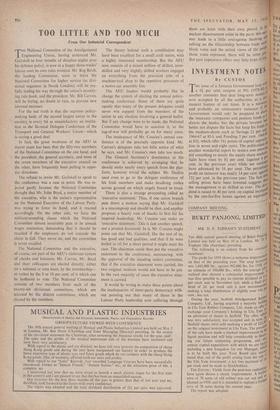TOO LITTLE AND TOO MUCH
From Our Industrial Correspondent
ute National Committee of the Amalgamated I Engineering Union, having sentenced Mr. Gaitskell to four months of sleepless nights over his defence policy, is now in a happy three-weeks' labour over its own rules revision. Mr. Reg Birch, the leading Communist, soon to leave the National Committee for higher service (as divi- sional organiser in North London), will be joy- fully leafing his way through the union's mystify- ing rule ,book, and the president, Mr. Bill Carron, will be trying, no doubt in vain, to prevent new internal excesses.
For the sad truth is that the supreme policy- making body of the second largest union in the country is every bit as unsatisfactory an institu- tion as the Biennial Delegate Conference of the Transport and General Workers' Union—which is saying a good deal.
In fact, the great weakness of the AEU in recent years has been that the fifty-two members of the National Committee on the one hand, and the president, the general secretary, and most of the seven members of the executive council on the other, have frequently been pulling in oppo- site directions.
The refusal to invite Mr. Gaitskell to speak to the conference was a case in point. He was re- jected partly because the National Committee thought that Mr. John Boyd, a senior member of the executive, who is the -union's representative on the National Executive of the Labour Party, was trying to force its hand, and it reacted accordingly. On the other side, we have the militant-sounding clause which the National Committee almost invariably puts in its annual wages resolution, demanding that it should be recalled if the employers do not concede the claim in full. They never do, and the committee is never recalled.
The National Committee and the executive, of course, are part of the AEU's elaborate system of checks and balances. Mr. Carron, Mr. Boyd and their colleagues are elected directly, either on a national or area basis, by the membership— or rather by the 8 or 10 per cent. of it which can be bothered to vote. The National Committee consists of two members from each of the twenty-six divisional committees, which are selected by the district committees, which are elected by the members.
The theory behind such a constitution may have been excellent for a small craft union, with a highly interested membership. But the AEU now, consists of a mixed million of skilled, semi- skilled and very slightly skilled workers engaged on everything from the precision jobs of a machine-tool shop to the repetitive processes of a motor-car assembly line.
The AEU leaders would probably like to change the system of electing the annual policy- making conference. Some of them say quite openly that many of the present delegates could never win support from the members of the union in any election involving a general ballot. But if any change were to be made, the National Committee would have to sanction it, so the tug-of-war will probably go on for many years.
The inadequacy of Mr. Cousins's annual con- ference is of the precisely opposite kind. Mr. CarroWs delegates take too little notice of what he says, and Mr. Cousins's men take too much.
The General Secretary's dominance at the conference is achieved by arranging that he should make nearly every speech from the plat- form, however trivial the subject. Mr. Deakin used even to go to the delegate conference of• his Irish members and make headlong rushes across ground on which angels feared to tread.
There is also a strange proceeding called an 'executive statement.' Thus, if one union branch puts down a motion saying that Mr. Gaitskell is a nincompoop and should be shot, and another proposes a hearty vote of thanks to him for his inspired leadership, Mr. Cousins can make an 'executive statement.' This is just another speech, not a printed document. In it, Mr. Cousins might point out that Mr. Gaitskell, like the rest of us, has good and bad qualities, and that if he were boiled in oil for a short period it might meet the case. The chairman could then put the executive statement to the conference, announcing, with the approval of the standing orders committee, that if the executive statement were carried, the two original motions would not have to be put. In the vast majority of cases the executive state- ment is carried.
It would be wrong to make these points about the inadequacies of inner-party democracy with- out pointing out that many of those in the Labour Party leadership now suffering through
them are hoist with their own petard. it nuclear disarmament crisis in the party this s mer leads to a little courageous thinking talking on the relationship between trade III block votes and the actual views of the ee' those votes represent, there will be some g But past experience offers very little hope oft




































 Previous page
Previous page